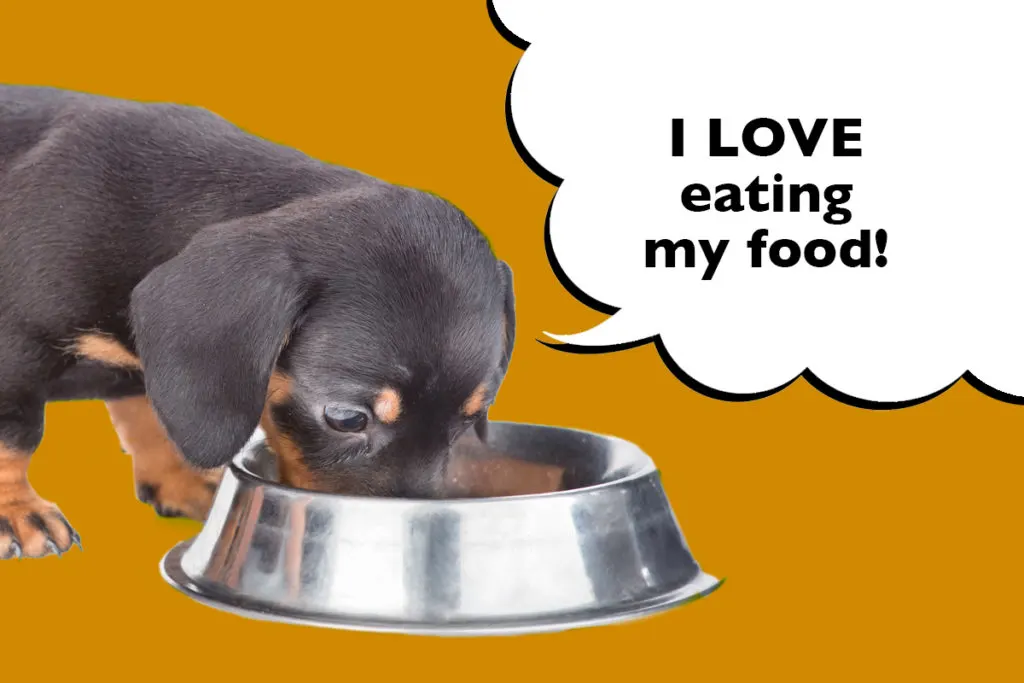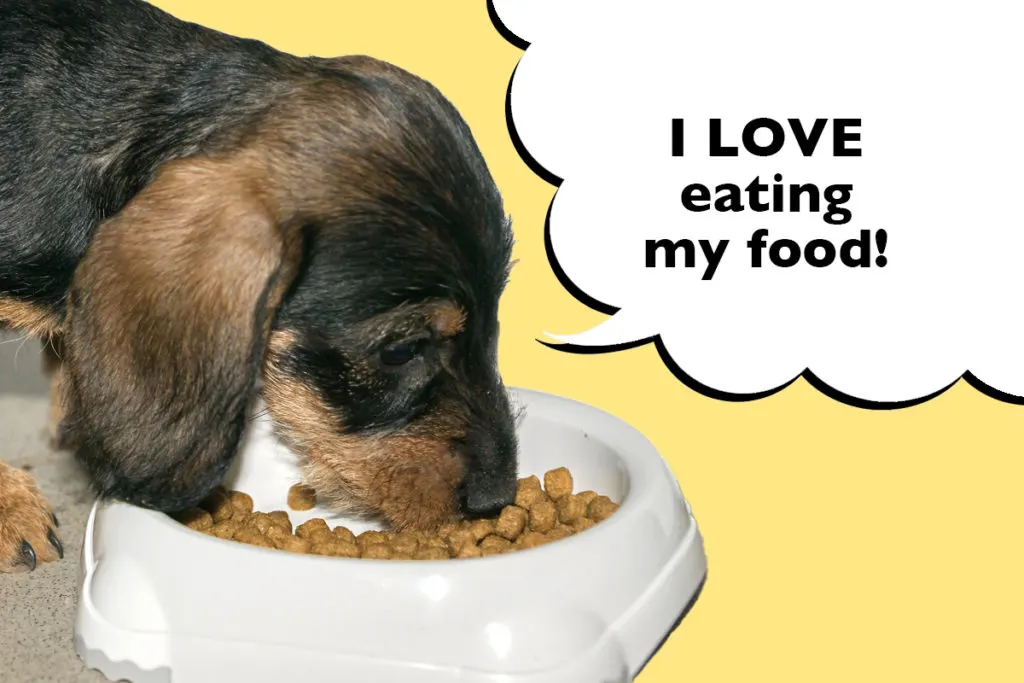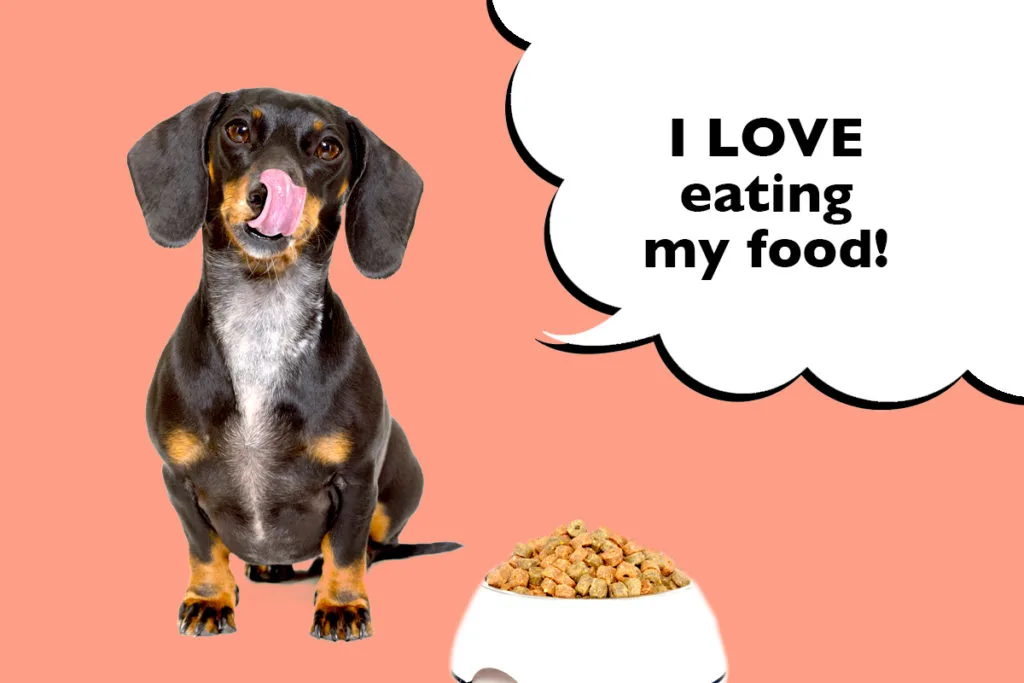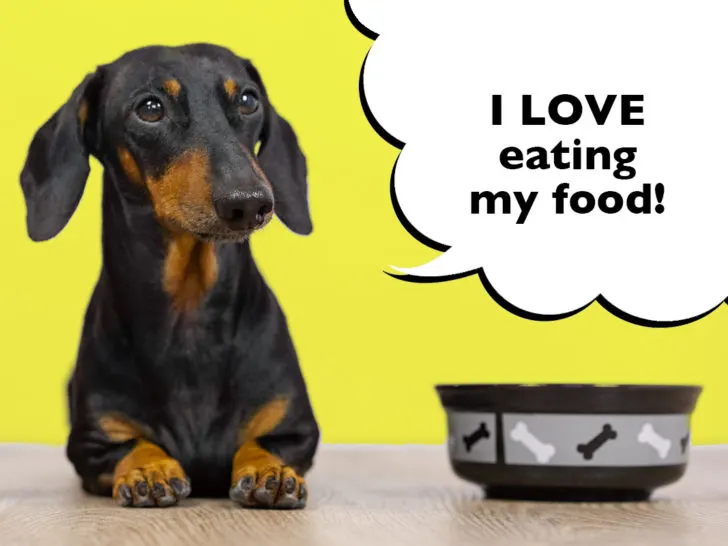Are you trying to decide on the best dog food to feed your Dachshund? Maybe you want to change your Dachshund’s regular food because they have allergies or intolerances? Here’s everything you need to know about what Dachshunds eat!
What Do Dachshunds Eat? Dachshunds eat dry, raw, wet, fresh, natural and home-cooked dog food. However, you need to make sure you get the ‘complete’ versions of your chosen dog food so your Dachshund gets the full range of nutrition they need to stay healthy.
Read on to find out more about the different dog foods Dachshunds can eat, what ingredients to look out for on the label, and how often to feed your adult Dachshund and puppy!
Never use the advice in this article as a substitute for professional veterinary advice or treatment. I am NOT a Vet, qualified dog trainer or dog behaviourist. This article is based on research, personal opinion and experience of owning dogs over the last 12+ years.
What Dog Food Do Dachshunds Eat?
Dachshunds fall into two camps. Some can’t get enough of their dog food and others are the fussiest of eaters! However, it’s important for them to get the right nutrition from their diet in order to stay healthy and in tip-top condition.
Here’s everything you need to know about the different types of dog food your Dachshund can eat. You’ll need to choose from either ‘puppy’, ‘adult’ or ‘senior dog food’, depending on the age of your Dachshund:
Dachshunds Eat Dry Dog Food
Dry dog food is also known as kibble. It’s usually oven-baked at high temperatures to form small biscuits.
Kibble is a popular option for Dachshund owners to feed their dogs as it’s more affordable and you can buy it in bulk. It also keeps in the cupboard for ages!
Some dog food brands ‘freeze-dry’ their kibble so that fewer nutrients are lost during the cooking process. However, freeze-dried options tend to be a bit more expensive.
You just have to be sure you choose the ‘Complete’ option and not the ‘Complementary’ food. That way your Dachshund is getting all the nutrition they need to stay healthy.
Because kibble is crunchy and needs to be chewed, it’s a good option to help keep your Dachshund’s teeth clean too. Just make sure you don’t water it down and make it soft.
Try to avoid any dry dog foods that contain artificial ingredients too, as these aren’t healthy choices for your Dachshund.
Dachshunds Eat Wet Dog Food
Wet dog food is available in cans, pouches and trays. Many wet dog foods available in the shops are already ‘nutritionally complete’.
This basically means you can feed your Dachshund wet food without any added extras as they’re getting all the nutrients they need from this one dog food to stay healthy.
However, wet food alone may not be the best for your Dachshund’s dental health. Without having anything hard to crunch up or chew on, plaque and tartar can quickly build up on their teeth.
So, if they’re only being fed wet dog food, be sure to keep a close eye on your Dachshund’s teeth.
Like kibble, wet dog food lasts a long time in the cupboard and doesn’t need any special storage before it’s opened. However, once opened, you need to keep it in the fridge and use it up the next day.

Dachshunds Eat Raw Dog Food
Raw dog food isn’t as gruesome as it sounds. It’s conveniently available pre-packed and frozen into blocks or nuggets. These ‘nutritionally complete’ meals are usually made of meat, offal and bone minces or chunks.
Some owners make their own raw food meals for their Dachshunds. However, if you decide to go down this route, you must carefully balance the meals so your Dachshund gets the right nutrition in their diet to stay healthy.
Following something like the BARF diet can be a bit more tricky, so you’ll need to take the time to learn exactly what to do. The last thing you want is to become unwell from salmonella or E. coli bacteria!
Many Dachshund owners report their dogs have healthier coats and teeth when they’re fed on a raw food diet. Their poops are said to be less stinky, smaller and firmer too!
Your Dachshund also won’t need to eat as much raw food compared to other kinds of dog food because it’s meant to be more nutritious.
Just be sure you do thorough research and check with your Vet before switching your Dachshund to this kind of diet.
Dachshunds Eat Natural Dog Food
Natural dog food is made with higher quality, often human-grade, ingredients that are suitable for dogs. However, that does mean it’s generally a bit more expensive!
It’s premium dog food that’s more likely to contain fresh, wholesome ingredients, than fillers and cereals that could potentially aggravate your Dachshund’s digestive system and cause them allergies.
Natural foods can either be wet or dry and are ‘nutritionally complete’.
Pet food brands like Scrumbles (where I personally buy dog food for our Dachshund) and Lily’s Kitchen are good examples of natural dog food manufacturers in the UK. They also have natural dental sticks and healthy dog treats too!
Dachshunds Eat Home Cooked Dog Food
Some owners prefer to cook meals at home for their Dachshund. However, it’s important you feed the right amount of nutrients for growth and health.
Because Dachshunds can sometimes be fussy, feeding them a home-cooked diet can make it even more challenging to get them to eat a traditional dog food diet should you ever need to switch.
You should only really go down the home-cooked route if you know exactly what you’re doing and are confident you can get the balance of nutrients right – especially for a growing puppy.
Dachshunds Eat Fresh Dog Food
Fresh dog food brands like Butternut Box or Different Dog are newer to the dog food market. It’s similar to home-cooked food, but made commercially and then delivered to your door.
This means the dog food has been carefully formulated to ensure it contains all the proper nutrition your Dachshund needs – which is ideal if they have any specific requirements or allergies to ingredients.
Basically, high-quality ingredients are lightly cooked before being frozen to lock in the goodness – which is actually how a lot of human food is manufactured too.
You can check out the nutritional rating of any dog food brands on the website allaboutdogfood. This basically tells you how suitable your chosen dog food would be for your Dachshund.

Ingredients To Avoid In Your Dachshund’s Dog Food
No matter which dog food you choose to feed your Dachshund, there are some ingredients you should try to avoid if you can.
Dog foods that have meat or animal meal listed as the main ingredient should ideally be avoided. Meat meal is basically made from any part of an animal, and is a cheaper way to produce dog food.
Instead, choose dog food with whole meats or fish listed as the main ingredient on the back of the can or packet.
You should also avoid dog food made with any artificial ingredients, particularly colours, flavours, preservatives or additives. All of these are unhealthy for your Dachshund, especially if they’re eating them every day.
In general, dry food that’s multicoloured is considered lower quality. The colourings used in them are simply to entice owners to buy, but your Dachshund won’t be able to taste any difference!
You can look up the nutritional rating, ingredients and more information about your chosen dog food on www.allaboutdogfood.co.uk
This is a brilliant site that can tell you how suitable your chosen dog food will be for your Dachshund.
It’ll also compare the pricing of the different dog food brands too, and the key is to simply feed the best quality dog food you can afford.
What Dog Treats Can I Feed My Dachshund?
Treats should only make up around 10% of your Dachshund’s daily dog food allowance. Dachshunds are prone to obesity, so it’s important not to overfeed or they may start to gain too much weight.
Giving your Dachshund too many tasty treats can make them fussier around their mealtimes too, so they should only be given in moderation.
Always make sure treats are a suitable size for your Dachshund. Small dogs have small mouths and teeth, so they can struggle to eat large treats.
The dog treats you can feed your Dachshund are:
Fruits and Vegetables
Dachshunds tend to love fresh fruit and vegetables like cucumber, blueberries, bananas, carrots and green beans. They’re low in fat and calories so they’re great for keeping your Dachshund’s weight in check.
Vegetables can be cut into small cubes and given raw or cooked, whichever your Dachshund prefers. You can also buy natural fruit and vegetable treats from brands like Soopa.
Pre-Packaged dog treats
Pre-packed dog treats can be bought from pretty much any shop, making them really convenient. However, they often contain lower-quality ingredients, so be sure to check the packet carefully.
Dachshunds can have allergies and sensitive stomachs, which can be upset by some shop-bought treats. So try to choose pre-packed treats made from high-quality ingredients where possible.
Natural dog treats
Natural dog treats are arguably the most nutritious for your Dachshund. They’re made from 100% meat, fish or vegetables, usually with nothing else added to them.
Natural dog treats are traditionally air-dried, which locks in all their natural goodness. They retain a lot of their nutritional value because they’re not cooked and don’t have extra ingredients added.
Dachshunds often enjoy dried chicken fillets, fish skins, dried small fish cubes and dried tripe. These should be split into smaller sizes to make them more manageable to eat.

Homemade dog treats
You may want to make your Dachshund’s dog treats at home. There are loads of recipes available online for you to choose from.
Making your own treats means you know precisely what’s gone into them, which can be really useful if your Dachshund has any food intolerances or allergies.
How Much Should I Feed My Dachshund?
It’s impossible to say exactly how much to feed your Dachshund as there are many different factors to think about.
For example, whether you have a Miniature or Standard Dachshund, their age (puppy, adult or senior), activity level, health, weight, and the type of dog food they’re being fed, all need to be considered.
One thing’s for sure, you shouldn’t feed your Dachshund too much in one go. It’s always best to split the daily food allowance into two or three meals a day.
Lower quality dog food contains lots of fillers, so they’ll need to eat more to fill them up. Feeding a higher quality dog food may mean you don’t need to give your Dachshund quite so much of it.
Although some Dachshunds can be fussy eaters, once they find a food they like, they can easily overeat. So it’s important not to let your Dachshund become overweight as this can put extra strain on their already fragile back.
So check your Dachshund’s weight and read the feeding guidelines on the back of the packet, pouch, tray or can to find out how much you need to feed your Dachshund.
How Often Should I Feed My Dachshund?
Dachshund puppies from 8 weeks to 4 months old should be fed 4 small meals a day at around 7am, 11am, 2pm and 5pm. This helps keep your puppy’s blood sugar stable during the day and aids digestion too.
Very young Dachshund puppies grow rapidly in the first few months. They need feeding at regular intervals throughout the day to give them all the calories and nutrients they need for growth.
From 4-6 months old, this then decreases down to 3 meals a day, at around 7am, 12 noon and 5pm. These feeding times aren’t set in stone, it’s just to give you a rough idea.
Then at around 6 months old, they can move to 2 meals a day at around 7am and 5pm and stay on this schedule for life.
However, this decrease in meals does NOT mean a decrease in the amount of dog food you feed. It is the exact same ‘daily food allowance’ but just split into 2, 3 or 4 portions.
Having said that, some Dachshunds simply do better staying on 3 meals for longer than 6 months, and that’s ok. It just depends on the individual dog. Staying on 3 meals until they’re a year old wont do them any harm – as long as you’re not overfeeding!
Again, it’s the same amount of dog food each day that is recommended for your Dachshund’s size, age activity level, health, and weight, and you just divide the portions into 2, 3 or 4.
Senior Dachshunds can sometimes have a reduced appetite because they’re less active, so may be happy with just one meal a day as they get older.
However, if your Senior Dachshund suddenly goes off their food, then you should organise a check up at your local Vet.
When Should I Switch My Dachshund From Puppy To Adult Food?
Dachshunds should be switched from puppy to adult dog food at around 9-12 months of age.
If your Miniature Dachshund is on the small side, they may need to switch to adult dog food nearer the 9 month old mark. Standard Dachshunds tend to a bit later at around 12 months old.
The best idea is to get a Vet health check when your puppy reaches about 8 months old, and then ask your Vet when the right time is for your individual dog.
Dietary changes can sometimes be difficult on a Dachshund’s digestive system when done too quickly. So transition your Dachshund from puppy to adult dog food over the course of around ten days.
It’s also better, if you can, to try and stay with the same brand of dog food and just change from the puppy to adult version. That way the change shouldn’t be so noticeable.
So, there you have it! Dachshunds love their food but some can be a bit fussy! They can eat dry food, wet food, natural food, fresh food, home cooked food or raw food. But, regardless of the dog food you feed them, just make sure you feed a ‘complete’ meal to keep your Dachshund healthy.
What do I do next?
Thank you for reading all the way to the end of this article, your support for my blog means everything to me! If you found this article helpful, please kindly share below. Thank you!

